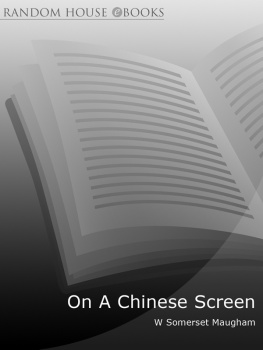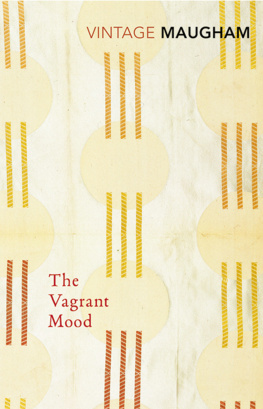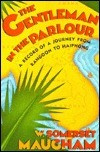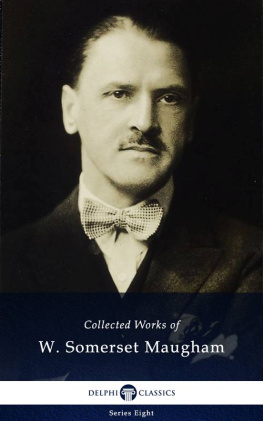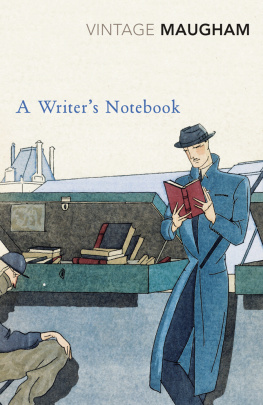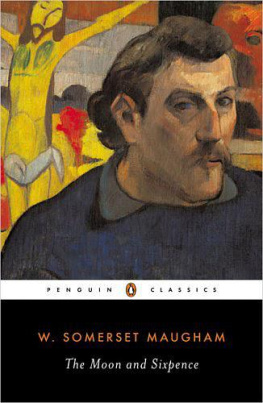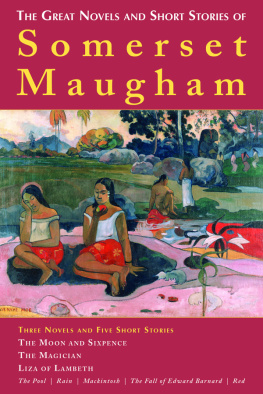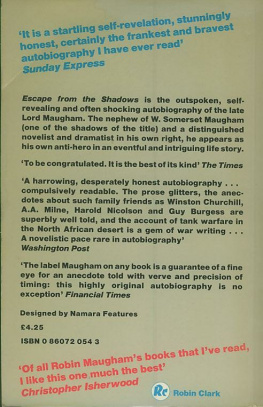W. MAUGHAM - The Razor's Edge
Here you can read online W. MAUGHAM - The Razor's Edge full text of the book (entire story) in english for free. Download pdf and epub, get meaning, cover and reviews about this ebook. genre: Prose. Description of the work, (preface) as well as reviews are available. Best literature library LitArk.com created for fans of good reading and offers a wide selection of genres:
Romance novel
Science fiction
Adventure
Detective
Science
History
Home and family
Prose
Art
Politics
Computer
Non-fiction
Religion
Business
Children
Humor
Choose a favorite category and find really read worthwhile books. Enjoy immersion in the world of imagination, feel the emotions of the characters or learn something new for yourself, make an fascinating discovery.

The Razor's Edge: summary, description and annotation
We offer to read an annotation, description, summary or preface (depends on what the author of the book "The Razor's Edge" wrote himself). If you haven't found the necessary information about the book — write in the comments, we will try to find it.
W. MAUGHAM: author's other books
Who wrote The Razor's Edge? Find out the surname, the name of the author of the book and a list of all author's works by series.
The Razor's Edge — read online for free the complete book (whole text) full work
Below is the text of the book, divided by pages. System saving the place of the last page read, allows you to conveniently read the book "The Razor's Edge" online for free, without having to search again every time where you left off. Put a bookmark, and you can go to the page where you finished reading at any time.
Font size:
Interval:
Bookmark:
W. Somerset MAUGHAM
The Razor's Edge
I
I have never begun a novel with more misgiving. If I call it a novel it is only because I don't know what elseto call it. I have little story to tell and I end neither with a death nor a marriage. Death ends all things and so is the comprehensive conclusion of a story, but marriage finishes it very properly too and the sophisticated are ill-advised to sneer at what is by convention termed a happy ending. It is a sound instinct of the common people which persuades them that with this all that needs to be said is said. When male and female, after whatever vicissitudes you like, are at last brought together they have fulfilled their biological function and interest passes to the generation that is to come. But I leave my reader in the air. This book consists of my recollections of a man with whom I was thrown into close contact only at long intervals, and I have little knowledge of what happened to him in between. I suppose that by the exercise of invention I could fill the gaps plausibly enough and so make my narrative more coherent; but I have no wish to do that. I only want to set down what I know of my own knowledge.
Many years ago I wrote a novel called The Moon and Sixpence. In that I took a famous painter, Paul Gauguin, and, using the novelist's privilege, devised a number of incidents to illustrate the character I had created on the suggestions afforded me by the scanty facts I knew about the French artist. In the present book I have attempted to do nothing of the kind. I have invented nothing. To save embarrassment to people still living I have given to the persons who play a part in this story names of my own contriving, and I have in other ways taken pains to make sure that no one should recognize them. The man I am writing about is not famous. It may be that he never will be. It may be that when his life at last comes to an end he will leave no more trace of his sojourn on earth than a stone thrown into a river leaves on the surface of the water. Then my book, if it is read at all, will be read only for what intrinsic interest it may possess. But it may be that the way of life that he has chosen for himself and the peculiar strength and sweetness of his character may have an ever-growing influence over his fellow men so that, long after his death perhaps, it may be realized that there lived in this age a very remarkable creature. Then it will be quite clear of whom I write in this book and those who want to know at least a little about his early life may find in it something to their purpose. I think my book, within its acknowledged limitations, will be a useful source of information to my friend's biographers.
I do not pretend that the conversations I have recorded can be regarded as verbatim reports. I never kept notes of what was said on this or the other occasion, but I have a good memory for what concerns me, and though I have put these conversations in my own words they faithfully represent, I believe, what was said. I remarked a little while back that I have invented nothing; I want now to modify that statement. I have taken the liberty that historians have taken from the time of Herodotus to put into the mouths of the persons of my narrative speeches that I did not myself hear and could not possibly have heard. I have done this for the same reasons as the historians have, to give liveliness and verisimilitude to scenes that would have been ineffective if they had been merely recounted. I want to be read and I think I am justified in doing what I can to make my book readable. The intelligent reader will easily see for himself where I have used this artifice, and he is at perfect liberty to reject it.
Another reason that has caused me to embark upon this work with apprehension is that the persons I have chiefly to deal with are American. It is very difficult to know people and I don't think one can ever really know any but one's own countrymen. For men and women are not only themselves; they are also the region in which they were born, the city apartment or the farm in which they learn to walk, the games they played as children, the old wives' tales they overheard, the food they ate, the schools they attended, the sports they followed, the poets they read, and the God they believed in. It is all these things that have made them what they are, and these are the things that you can't come to know by hearsay, you can only know them if you have lived them. You can only know them if you are them. And because you cannot know persons of a nation foreign to you except from observation, it is difficult to give them credibility in the pages of a book. Even so subtle and careful an observer as Henry James, though he lived in England for forty years, never managed to create an Englishman who was through and through English. For my part, except in a few short stories, I have never attempted to deal with any but my own countrymen, and if I have ventured to do otherwise in short stories it is because in them you can treat your characters more summarily. You give the reader broad indications and leave him to fill in the details. It may be asked why, if I turned Paul Gauguin into an Englishman, I could not do the same with the persons of this book. The answer is simple: I couldn't. They would not then have been the people they are. I do not pretend that they are American as Americans see themselves; they are American seen through an English eye. I have not attempted to reproduce the peculiarities of their speech. The mess English writers make when they try to do this is only equalled by the mess American writers make when they try to reproduce English as spoken in England. Slang is the great pitfall. Henry James in his English stories made constant use of it, but never quite as the English do, so that instead of getting the colloquial effect he was after, it too often gives the English reader an uncomfortable jolt.
2In 19191 happened to be in Chicago on my way to the Far East, and for reasons that have nothing to do with this narrative I was staying there for two or three weeks. I had recently brought out a successful novel and being for the moment news, I had no sooner arrived than I was interviewed. Next morning my telephone rang. I answered.
'Elliott Templeton speaking.'
'Elliott? I thought you were in Paris.'
'No, I'm visiting with my sister. We want you to come along and lunch with us today.'
'I should love to.'
He named the hour and gave me the address.
I had known Elliott Templeton for fifteen years. He was at this time in his late fifties, a tall, elegant man with good features and thick waving dark hair only sufficiently greying to add to the distinction of his appearance. He was always beautifully dressed. He got his haberdashery at Charvet's, but his suits, his shoes, and his hats in London. He had an apartment in Paris on the Rive Gauche in the fashionable Rue St Guillaume. People who did not like him said he was a dealer, but this was a charge that he resented with indignation. He had taste and knowledge, and he did not mind admitting that in bygone years, when he first settled in Paris, he had given rich collectors who wanted to buy pictures the benefit of his advice; and when through his social connexions he heard that some impoverished nobleman, English or French, was disposed to sell a picture of first-rate quality he was glad to put him in touch with the directors of American museums who, he happened to know, were on the lookout for a fine example of such and such a master. There were many old families in France and some in England whose circumstances compelled them to part with a signed piece of Buhl or a writing-table made by Chippendale himself if it could be done quietly, and they were glad to know a man of great culture and perfect manners who could arrange the matter with discretion. One would naturally suppose that Elliott profited by the transactions, but one was too well bred to mention it. Unkind people asserted that everything in his apartment was for sale and that after he had invited wealthy Americans for an excellent lunch, with vintage wines, one or two of his valuable drawings would disappear, or a marquetry commode would be replaced by one in lacquer. When he was asked why a particular piece had vanished he very plausibly explained that he hadn't thought it quite up to his mark and had exchanged it for one of much finer quality. He added that it was tiresome always to look at the same things.
Font size:
Interval:
Bookmark:
Similar books «The Razor's Edge»
Look at similar books to The Razor's Edge. We have selected literature similar in name and meaning in the hope of providing readers with more options to find new, interesting, not yet read works.
Discussion, reviews of the book The Razor's Edge and just readers' own opinions. Leave your comments, write what you think about the work, its meaning or the main characters. Specify what exactly you liked and what you didn't like, and why you think so.


